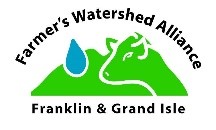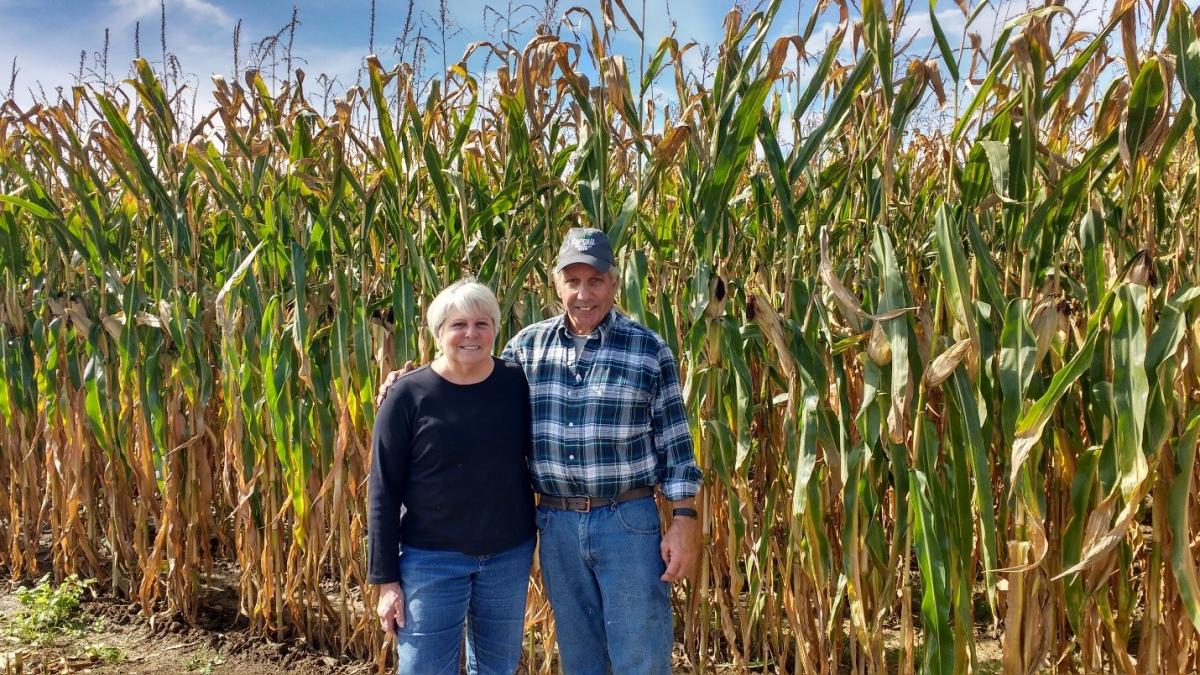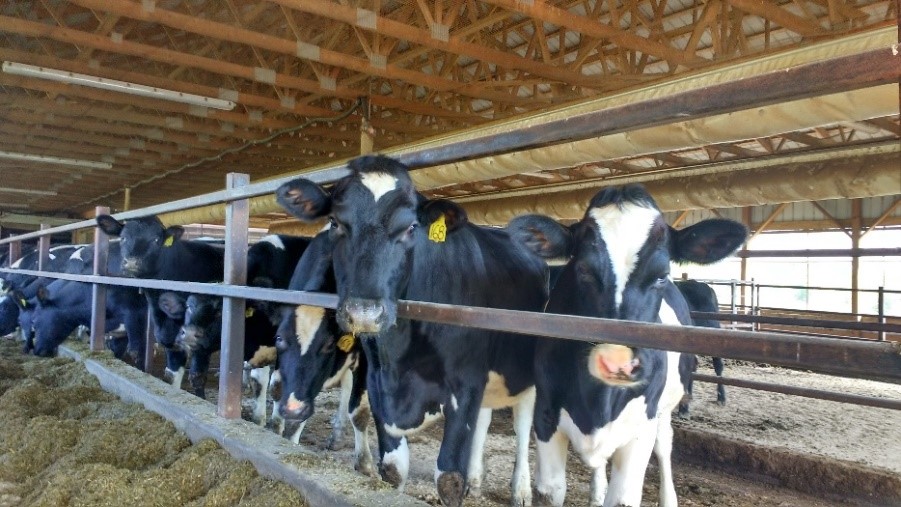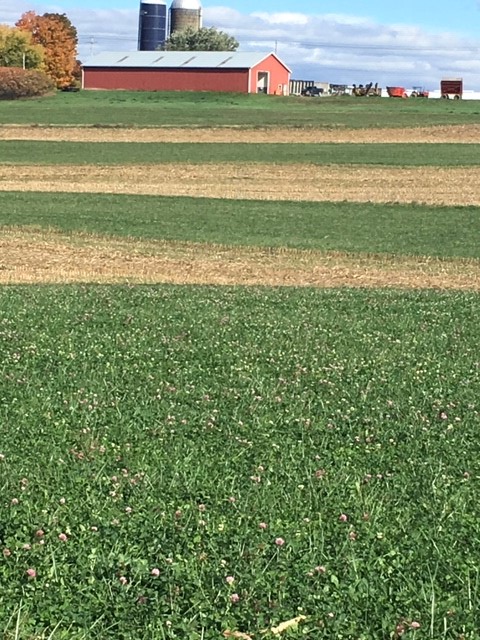By Lindsey Ruhl, Franklin and Grand Isle Farmer’s Watershed Alliance 
Introduction
The Farmers Watershed Alliance of Franklin and Grand Isle is a farmer driven organization that aims to work with farmers to improve water quality in the Lake Champlain Basin. In this article, our featured farmer and FWA member is Wayne Fiske, owner of Windfall Acres, a first generation farmer, FWA board member for ten years, new FSA board member, father of four, and grandfather of ten. Wayne’s past community involvements include serving as an MVU board member for six years, Franklin select boards for 10 years, Franklin Road Commissioner for 5 years, and on the Friends of the Northern Lake and Franklin Watershed Committees. He is also the recipient of the Franklin County NRCS District Outstanding Conservation Farmer and Vermont Dairy of Distinction awards.
 When I arrived at Windfall Acres in the fall of 2018, Wayne was working with his son Jon, to get the chopper ready for another round of corn harvesting. His wife, Nancy, had just left to purchase a part that needed replacing. We had just gotten a heavy deluge of rain the day before, but today was bright and sunny, and by mid-morning the corn was dry enough to harvest.
When I arrived at Windfall Acres in the fall of 2018, Wayne was working with his son Jon, to get the chopper ready for another round of corn harvesting. His wife, Nancy, had just left to purchase a part that needed replacing. We had just gotten a heavy deluge of rain the day before, but today was bright and sunny, and by mid-morning the corn was dry enough to harvest.
Wayne and Nancy bought the farm nearly 40 years ago at a time when the farm they were renting in St. Albans was slowly being sold to developers. It was a big change, moving from an operation that could house 40 cows to one that could be a home to more than twice that many. He now milks 135 cows.
Water Quality Efforts
Nestled close to the start of the Rock River, Wayne notes, “we have to be careful of what we are doing.” But even before water quality became the hot topic it is today, Wayne had been managing his farm to reduce erosion. Shortly after he bought the farm, he noticed that 2-3 foot gullies were forming in his corn land. Recognizing that this loss of soil meant a loss in productivity, he changed his management practices to incorporate strip cropping, alternating stretches of corn and hay. If the water gathers speed and sediment in the sections of corn, the hay reduces the speed and catches the sediment, preventing runoff into local waterways. A government program paid for five years of strip cropping and Wayne has kept it in his management system for over 30. Only one year did he plant corn in the entire field and the effectiveness of the strip cropping was once again proven
Another water quality effort Wayne was quick to point out was the silage leachate (liquid seeping from stored feed) system built with the help of an NRCS engineer. He emphasized that the project was successful because she was willing to listen and together they built a system that worked for him. Wayne, like most farmers in Vermont, also plants cover crops (plants grown during the off-season) that cover the ground, preventing erosion and soaking up nutrients like phosphorus. And this year he put some of his corn in no-till, a management system that disturbs the soil as little as possible. He had tried no-till a number of years ago, but it was still a relatively new practice, not much was known about how to do it right in Vermont, and his corn yielded poorly that year. Now that no-till has become more prominent in Vermont, he was willing to try it again and is seeing good results.
Milk in Context
And Wayne really loves farming. He went to school for heavy equipment and tried a year of construction work, all the while thinking about agriculture. But the dairy business is a struggle these days. According to the USDA, since 2015 the average cost to produce milk has been 3 dollars more than dairy farmers are getting paid to produce it. Consumers may be surprised to hear that the cost they pay at the grocery store for a gallon of milk actually dropped by 19 cents between 2015 and 2017, in 2018, that price went down another 30 cents. Great for us, not so great for farmers like Wayne. It’s disheartening and discouraging to put all your time, effort, your life into creating a product you are proud of, that most people use in their everyday lives, and still wonder if it’s a business you would want to pass on to your grandchildren. These are just a few reasons why it’s so important to support your local farmer.
Resilience
 In these difficult times of low milk prices and increasingly expensive regulations, I ask him why he does it: the 12-16 hour work days, constantly jumping from one thing to the next, putting the cows first, and delaying holiday celebrations for farm work. Wayne said more than once in my short time with him that, he “wouldn’t trade it for anything…there’s not a better way, not a better place to raise a family.”
In these difficult times of low milk prices and increasingly expensive regulations, I ask him why he does it: the 12-16 hour work days, constantly jumping from one thing to the next, putting the cows first, and delaying holiday celebrations for farm work. Wayne said more than once in my short time with him that, he “wouldn’t trade it for anything…there’s not a better way, not a better place to raise a family.”
For Wayne, there is no non-work day, no weekend. His Saturday is the same as his Friday, but he still appreciates the beauty of the sunset and the sunrise on his farm. He appreciates his family’s support, not only in understanding his work commitments, but as an integral part to the success of the farm in the early years with milk and odd chores. Help in times of needs still continues to be given from his children, Heather, Sarah, Jon, Ashley, their spouses, and their children. His wife, Nancy, got up each morning to get the kids ready, worked her nursing job, and came home afterward to help on the farm. She took vacation days to help chop corn. Now, partially-retired, she still chops the corn, an activity that still puts a smile on her face. She says, “It’s the best part of the year.”
And for the Fiskes, there’s no end in sight. To give the farm every opportunity to succeed, Wayne and Nancy hired a full time milker, are diversifying production by adding beef cows, and constructing a greenhouse for vegetable production. It’s a new chapter in their lives and as Nancy said, “I’m all in.” As Wayne noted, “I’m getting toward retirement and it’s hard to let go…giving up is not for me.”
I asked them both why they chose farming. Their responses echo how a lot of farmers feel: it’s tangible, it challenging, it provides a sense of purpose, the ability to see your accomplishments every day, not seeing yourself do anything else. Wayne remarked, “It’s a way of life. It’s in my blood I guess…wouldn’t have it any other way.” At one point in my time with Wayne, he frankly said, “Proud of it, damn right.” And he should be.
###
If you are interested in becoming a member of the FWA, you can email farmerswatershedalliancenw@gmail.com or you can contact Scott Magnan at 802-527-7707. Being a member of the FWA means more than assistance, it also brings farmers a further sense of community. Through becoming a member you can stay up-to-date on local events, networking opportunities, regulatory updates, agricultural news, current crop issues, and much more.
